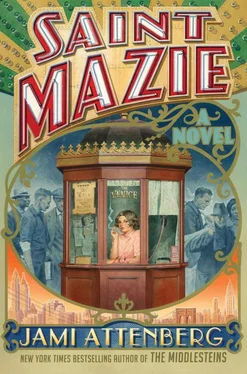He said: Change I got plenty of. I just came to talk to you about Jeanie.
I said: What about her?
He said: I’m worried about her.
I didn’t know he was talking to her. As far as I knew I was the only one from New York City she still kept in touch with. I asked him why he was worried and he gave me this long story, the short of it being that he’s been giving her money for a few years to help her out, which I found awful funny because I’ve been doing the exact same thing.
Anyhow he said she sounded sad lately, sad and lonely, and he wondered if he should try to get her a train ticket home, and if he did would I be willing to take her in? I told him she was my sister and I loved her and she’d always have a home with me but if he was going to go to the trouble of bringing her home he might as well just keep her for himself.
Mazie’s Diary, November 1, 1933
Well I’m over twenty-one, that much I know.
Mazie’s Diary, November 13, 1933
Today a truck pulled up in front of the Venice, just before the sunset. The driver left the car running and dashed over to my cage with a big sack of something. He dumped it on my counter.
I said: What’s this?
He said: A fella named Rufus sent it to you. He said to say thanks.
I peeked into the sack. Green apples.
Bums came out of nowhere all of a sudden, like they could smell the fresh air and sunshine on it. I handed them out, one by one, and then saved the last for myself.
Mazie’s Diary, December 5, 1933
Prohibition’s over, and this city’s yawning. We’ve been making our own rules for years. Someone announced it at Finny’s and there were a few cheers and one fella applauded until he realized he was the only one clapping.
Somebody said: I liked being illegal. It helped pass the time.
George Flicker
So the time came for us to move and I set everything up, and I was pretty chuffed about the whole thing, that I had maneuvered us in there. We were living on the twelfth floor, East Court. They had a two-bedroom corner apartment, Al and I had a one-bedroom next door. We both had great views of the bridge. I think there was a little talk at the last minute about trying to get a three-bedroom. Jeanie was supposed to come home. They didn’t really want her there though. Well Mazie did but Rosie didn’t. Or maybe Rosie did but Mazie didn’t. There was tension around her. I told them I didn’t think I could get them a three-bedroom and they backed down. Oh you know what? It was Rosie after all. Rosie was the angry one. Because now I remember her saying, “She’ll have to crawl back on her knees, she should know something about that.”
Mazie’s Diary, January 10, 1934
Jeanie’s back. She took a train from Chicago, no chauffeur this time around. We had coffee at the diner. Her hair’s down to her waist, and her eyes still glitter, and she’s still slender, all tree boughs bending in the wind. But her skin is off. It’s dull and yellow, porridge that’s been sitting out for too long. She’s not the same girl she was, but still she’ll always be beautiful to me. I told her if she didn’t feel like staying with Ethan she didn’t have to. He wanted to throw all that money at her for all that time, it was his problem, not hers. I said the minute she wanted out I’d find her somewhere to go.
She said: I don’t mind one bit. He’s been better to me than any of the rest of them.
I said: I don’t know any of the rest of them.
She said: And trust me you don’t want to.
I laughed. It was a joke I would make.
I said: Are you truly done now?
She said: I believe so. I can’t think of anything else I feel like I have to do. This might be the problem though. I can’t think of anything I even want to do.
I said: You haven’t sat still yet. You oughtta try that on for size.
I told her she could come and work for me whenever she liked. I told her not to worry, she’d find a way to survive on her own. And I would help her.
George Flicker
So we move in to the Knickerbocker Village in 1934. We didn’t have much, me and Al. We had our beds, some clothes, all of Uncle Al’s books. Those ladies showed up with an army of Russian movers carrying steamer trunks of clothes, boxes and boxes of tchotchkes, beds, lamps, desks, bookshelves, rugs, paintings, and that goddamn table I hit my head on when I was a kid. And there’s Rosie barking at all of them, move this here, move that there. Al and I are standing there watching all this. He probably hadn’t seen her in five years, ten, I don’t know how long. I mean maybe he had but he wasn’t acting like it. He’s watching her boss all these people around and then he just lets out this whistle. Not a wolf whistle but something like it. You could not have mistaken that sound for something innocent. I said, “Al, calm yourself down, man, these are our new neighbors.” He said, “I must have done something right to deserve this.” I said, “Al, it’s Rosie Gordon! You remember her. She used to live upstairs. What are you doing here? You can’t hassle this lady.” He said, “How did I miss that? How did I ever miss this woman before.”
Mazie’s Diary, March 1, 1934
I dug you out of this box just to write this down so that I never forget this moment. I came home last night to find Rosie sitting on Al Flicker’s lap at our kitchen table.
I said: Well.
She said: Well.
I said: What have we here?
She said: Mazie, you remember Al Flicker, don’t you?
I am cackling as I write this. Cackling at how dainty and ladylike she acted all the while she was sitting on his lap, her bottom on who knows what although I know what. And I am cackling at the two loons who are now singing little songs to each other in the next room. Every once in a while they clink glasses and toast each other and I just start laughing all over again. I am cackling at life. You’re funny, life. Real funny.
George Flicker
And then the thing we could never have predicted in a million years happened almost immediately after we moved in. Rosie and Al fell in love. Can you believe it? The two craziest people we knew fell for each other. Like someone knocked them over the head with it. Like someone knocked them over the head with love.
9. Excerpt from the unpublished autobiography of Mazie Phillips-Gordon
What kills me about these bums is that they die, they’re gone, and it’s like they never even existed on God’s green earth. Someone knew them once. A mother, a father, a doctor, a pal, somebody knew their name. But now they’re only known by each other, and then bit by bit, they’re forgotten. Quicker than they’d like, probably. And everybody wants to be remembered, don’t they? Everybody wants one little piece of them to be left behind. Well, I remember them. I remember them all. They were nobody to nearly everybody, but they were somebody to me. I knew all their names. Everyone’s names. I knew them.
Phillip Tekverk, publisher emeritus, Tekverk Books
I was twenty-one years old, and an editorial assistant at Knopf. It was 1939. I had heard about Mazie Phillips from a few sources, but Fannie Hurst was the first. I had been invited to a dinner party at her house by an older gentleman who I believe was endeavoring to make me one of his fancy lads, though he wasn’t quite sure if I would be amenable to that sort of thing. People have always wondered about my sexual proclivities, and I had just approached the moment where I recognized that the mystery surrounding that area of my life could be of benefit to me. That, in fact, I could and should cultivate that mystery even further. And it has certainly helped me in my life. There is power in elusiveness. Even just to be charming is, of course, great assistance to one. But to leave people guessing about you, that adds a whole new layer of memorability.
Читать дальше












